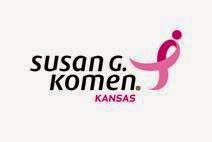She had put it off, she said, because she didn't want to face the possibility of being diagnosed with breast cancer if she had a mammogram. She didn't have time for breast cancer.
Among African-American women in Kansas, while breast cancer incidence rates are lower than those among Caucasian women, 14 percent of those cases are diagnosed in either stage III or stage IV, double the percentage of stage III or stage IV among Caucasian women.
The grassroots effort, Witness Project of Kansas, got started with Komen Kansas' help, Executive Director Gayle Thomas said, adding that her main concern was not research but helping women who have breast cancer find out about it. Thomas said that breast cancer is not as common in black women as in white women, and because of that and other reasons, black women often don’t talk about breast cancer or get tested. The result is that when they do get breast cancer, it is caught later, and the women often die in their 40s or 50s.
“I’m a small operation but I am 100 percent for women at risk whether they are African-American, English as a second language, or incarcerated.” said Thomas.
The Witness Project is a culturally informed, community-based breast cancer education program. It provides education and outreach programs using African American volunteer cancer survivors and community lay health advisors. It is designed to effectively increase awareness, knowledge, and motivation, thereby increasing screening and early-detection among African American women, Gayle Thomas works with volunteers in Wichita that go to such places as churches, hair salons and food banks to reach African American women who may not otherwise receive screenings for breast cancer. Most of the volunteers are survivors themselves who deliver lifesaving messages such as:
- Take care of yourself first. Otherwise you won't be any good to your family
- It's important to know one's body and to be your own advocate.
- Ask questions about the tests your doctor orders, ask more questions about the results and treatment options,
This year Komen Kansas has partnered with The Witness Project as they continue to educate African American women by raising awareness in early detection through screening, helping them navigate the heathcare system, and enroll in the Early Detection Works program if needed. Working together we will reach the goal to ultimately lower the continuing rise of the African American breast cancer mortality rate in Kansas.
Read more here: http://www.kansas.com/news/local/article1086107.html#storylink=cpy
Read more here: http://www.kansas.com/living/health-fitness/article1073939.html#storylink=cpy
Read more here: http://www.kansas.com/living/health-fitness/article1073939.html#storylink=cpy
